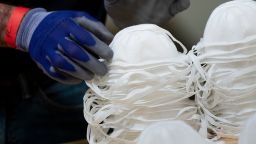Two new reports from the US Centers for Disease Control and Prevention warn that new coronavirus variants could lead to a rapid rise in the numbers of Covid-19 cases.
In one report released Wednesday, researchers from the CDC and Minnesota health department detailed cases of the B.1.1.7 variant, first identified in the United Kingdom. Earlier modeling data suggested this variant, which may be more transmissible, could become the predominant variant in the United States in March, and the CDC has urged people to take action to reduce spread.
The CDC’s Morbidity and Mortality Weekly Report described identified B.1.1.7 cases in specimens collected from eight Minnesota residents, ages 15 to 41, from mid-December through mid-January. Five reported Covid-19-like symptoms and three were asymptomatic.
Three of the people had a history of international travel in the two weeks before they became ill, including two who traveled in West Africa and one who traveled to the Dominican Republic, and three others had traveled to California, including one who received a positive test while in California and isolated before returning to Minnesota. None had a history of travel to the UK.
Identification of these variants in Minnesota “highlights the importance of mitigation measures such as mask use, physical distancing, avoiding crowds and poorly ventilated indoor spaces, isolation of persons with diagnosed COVID-19, quarantine of close contacts of persons with COVID-19, and adherence to CDC travel guidance,” the report says.
On Tuesday, the CDC reported at least 1,299 cases of coronavirus strains first spotted in the UK, South Africa and Brazil have been reported in the United States. The vast majority of these cases — 1,277 — are the B.1.1.7 variant originally detected in the UK. This variant has been found in 41 states and Washington, DC. Roughly a third are in Florida. Nineteen of those 1,299 are the B.1.351 variant first identified in South Africa.
These numbers do not represent the total number of such cases circulating in the United States, but rather, only those found by analyzing positive samples.
In a separate report released by the CDC on Wednesday, researchers from Zambia described how the detection of the B.1.351 variant first identified in South Africa coincided with a rapid rise of cases in Zambia – and this variant might have become the dominant strain there.
The B.1.351 variant might be circulating elsewhere in southern Africa, where many countries are reported rapid increases in Covid-19 case numbers in December and January, the report said.
“Spread of the B.1.351 variant is of public health concern because of the potential for increased transmissibility and, thus, increases in cases, hospitalizations, and deaths,” researchers wrote.





































